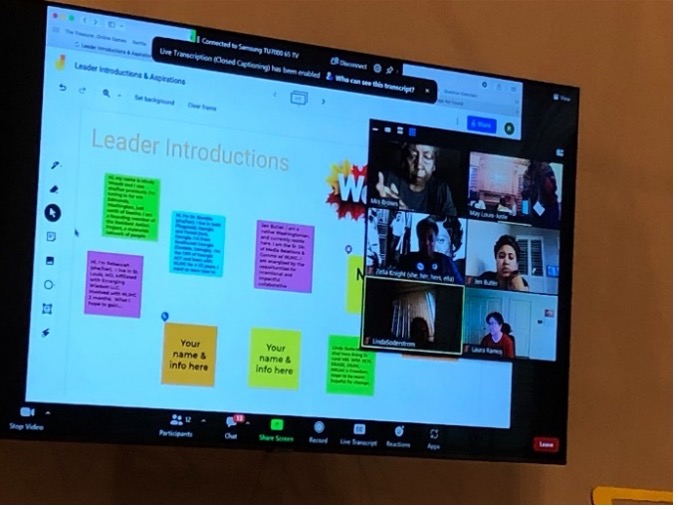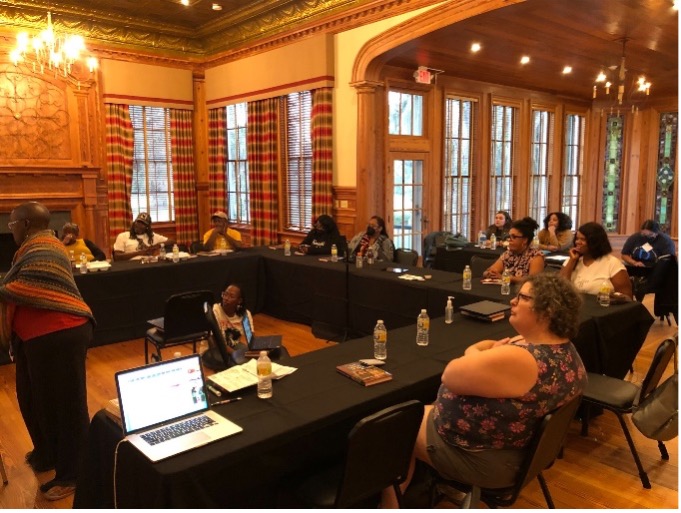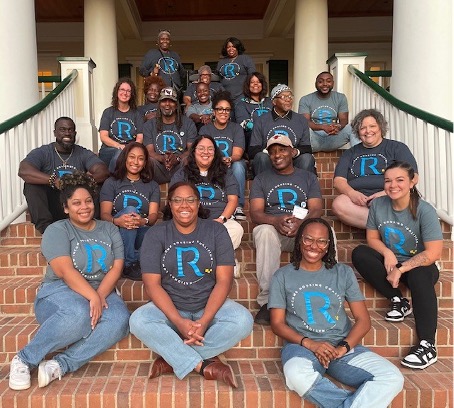NLIHC held its first-ever hybrid Tenant and Community Leader Retreat on October 7-10 in Albany, Georgia. The retreat gathered members of NLIHC’s Tenant Leader cohort, which is made up of people with lived experience of housing insecurity who have become leading voices and advocates in their communities in the fight for housing justice. The retreat aimed to introduce tenant leaders to each other and provide a forum for discussion about developments in their communities, topics for the tenant session of NLIHC’s annual policy forum, and plans to build out NLIHC’s policy agenda on tenant protections, for both subsidized and unsubsidized tenants. To ensure the group had sufficient tools to tackle these goals, NLIHC brought in several consultants to facilitate conversation and provide training on racial trauma and healing.
Tenants started their weekend by joining together in person and virtually at the Resora Experience in Albany, Georgia. Resora is part of the Cypress Pond Plantation that was owned by one of the largest slaveholders in Georgia. In 1999, the Cypress Pond Plantation was purchased by New Communities, Inc., the first community land trust in the United States. New Communities, Inc. has a rich history in Albany. The organization was created by the late Charles Sherrod and his wife Shirley Sherrod, who were founding members of the Student Nonviolent Coordinating Committee (SNCC).
Through their work with SNCC, Charles and Shirley played an important role in bringing the Civil Rights movement to Albany. In 1969, they founded New Communities, where they established a farm collective of black farmers covering over 5,735 acres in Lee County, Georgia. In 1985, the Sherrods lost all their land during a drought and applied for emergency loans that they never received, only to find out that their white counterparts received the very same emergency loans for which they had applied. The Sherrods took legal action, and as a result of Pigford v. Glickman were awarded $12 million, which they used to purchase the land that would become the Resora Experience. Since then, the Resora has been used to provide a space to explore social justice issues and efforts, such as racial healing and work like that undertaken by NLIHC’s tenant cohort. NLIHC staff and tenants were honored to spend such a transformative weekend on this deeply historical land.
After arriving at Resora, tenants immediately engaged with one another and NLIHC staff through team-building activities conducted both virtually and in person.


On Saturday, October 8, the tenant cohort went on a farm tour of the Resora, where they learned more about the historical significance of the farm, the food harvested yearly, and the historical significance of the different cabins: Monroe Gains, Slater King, Robert Christian, and Ms. Rosemary Mack. Geraldine West Hudley acted as the tour guide and provided the group with a unique perspective of the land as someone who grew up in Albany, Georgia. Tenants spent the rest of the day attending sessions where they could contribute to the creation of their cohort’s vision, mission, goals, and functions. The last session of the day focused on racial trauma and healing, conducted by consultants Aaron and Janell Lane. The tenant cohort members discussed how individual and institutional racism deeply impacts the way they function as individuals, how racism affects their organizing, and how to manage the trauma that comes with institutional racism. NLIHC staff and tenants finished off the night by sharing dinner with Rutha Mae Harris, who was one of the four Freedom Singers who sang at the original March on Washington. Rutha shared some of her songs with the group and discussed her experiences in Albany and with the Civil Rights movement. The night ended with a group dinner that gave everyone present a chance to reflect on the lessons learned throughout the day.

The retreat continued the next day with further sessions and activities for the group. The day started off with the second part of the racial trauma and healing training, conducted by the Lanes. The continuation of the day’s previous conversation focused on the healing aspect of the training and explored questions like: What does healing from racial trauma look like? How is it done? How can it be sustained as an ongoing process?
The rest of the day was dedicated to sharing aspirations and visions for NLIHC’s upcoming policy forum in 2023. These conversations were facilitated by Rebeccah Bennett, who created a framework for the group to build upon. The aspirations shared by group members addressed among other things what they needed as leaders in their work and as individuals. Examples included the development of a peer-to-peer network where community leaders could tap each other for insight and expertise on different issues; grant writing and funding resources for tenant-led organizations; resources for tenants on tenant rights and legal services; and the creation of toolkits for resident actions tailored to residents’ states and communities.
The day ended with a trip to the Vicks Estate, a bed and breakfast in Albany, for a “Taste of the South” experience. The group was hosted by Clinton Vicks, who cooked a delicious southern meal and also performed a song at the end of dinner. While at the Vicks Estate, resident leaders were able to meet and be in community with local housing advocates based in southwest Georgia, including Sherrell Byrd from SOWEGA Rising and BJ Jackson from Albany’s Department of Community and Economic Development.
The retreat ended the following day. Cohort members offered reflections about the weekend, provided closing remarks, and discussed next steps for the cohort, and for tenant engagement work at NLIHC.
Shortly after the tenant leaders departed the Resora, Charles Sherrod passed away at the age of 85. In lieu of flowers, the Sherrod family asks that tax-deductible donations in Reverend Sherrod’s name be made to The Charles Sherrod Community Development Corporation. If you would like to make a donation, please visit this page. You can learn more about the life of Charles Sherrod and the programs at the Sherrod Institute here.